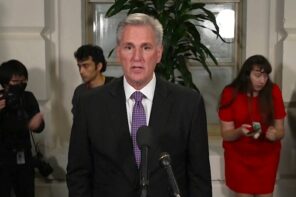“The strongest precedent for a right to teach a child at home is Roe v. Wade.” – Former HSLDA attorney Scott W. Somerville
As the Supreme Court considers Dobbs v. Jackson Women’s Health Organization, a case that could overturn the foundational 1973 reproductive rights decision Roe v. Wade, there is significant discussion about what the end of Roe means for people who can get pregnant. But Roe v. Wade concerns far more than reproductive rights. As a crucial case in American jurisprudence that establishes constitutional privacy rights for Americans, there are many other rights hanging on this ruling that Dobbs could throw into jeopardy. These include rights deeply cherished by the very evangelicals who are pushing so hard to end Roe, like the right to give your child a religious education or the right to homeschool your children.
It’s no coincidence that the Alliance Defending Freedom, the organization leading the crusade to overturn Roe in the Supreme Court (and which is designated as a hate group by the Southern Poverty Law Center) is run by evangelical homeschool advocate Michael Farris. Homeschoolers, who are overwhelmingly evangelical Christians, have long been forced-birth advocates. But on the cusp of victory, these forced-birth advocates might ironically be undermining the foundation of family privacy rights, thus endangering conservative practices like religious schooling and homeschooling.
While being a forced-birth advocate and evangelical are now almost synonymous, this was not always the case. In fact, as historian Randall Balmer notes in his most recent book, “The overwhelming response to Roe v. Wade on the part of evangelicals was silence, and the voices that spoke on the matter were ambivalent.”
This changed in the late 1970s. As evangelical advocacy for segregation became less popular, evangelicals were desperate for a different, less damning issue to galvanize their voter base. In a groundbreaking article for Politico, Balmer explains that, “It wasn’t until 1979—a full six years after Roe—that evangelical leaders, at the behest of conservative activist Paul Weyrich, seized on abortion not for moral reasons, but as a rallying-cry to deny President Jimmy Carter a second term. Why? Because the anti-abortion crusade was more palatable than the religious right’s real motive: protecting segregated schools.”
As evangelicals pivoted from segregation to abortion, they struck a nerve. Aided by the work of American evangelical theologian Francis Schaeffer and pediatric surgeon C. Everett Koop (later the Surgeon General under President Ronald Reagan), who jointly created a pro-forced-birth film series called Whatever Happened to the Human Race?, abortion quickly became the cause du jour of evangelicals. By 1980, Balmer says, “abortion had emerged as a rallying cry.” Today, 67% of white evangelical Protestants support significant restrictions on abortion, almost twice the number of white mainline Protestants (39%) and substantially higher than even Catholics (45%).
As many homeschoolers are evangelical Christians, it makes sense that homeschoolers have been key forced-birth advocates. But that’s also because forced-birth messages are being promoted from the top of the homeschool pyramid. (“The homeschool world is organized as a pyramid,” writes sociologist Mitchell Stevens in Kingdom of Children: Culture and Controversy in the Homeschooling Movement.) The leading lobbying organization for homeschoolers in the United States, the Home School Legal Defense Association (HSLDA), often promotes forced-birth messages in their emails to their members. Additionally, HSLDA’s founder is Michael Farris—the same Farris who is leading the ADF as they fight to overturn Roe via Dobbs.
Other individuals with significant influence and power in homeschooling, such as Gregg Harris, Brian Ray, and Mary Pride, have all lambasted not only abortion but also birth control. (Farris, Harris, Ray, and Pride also all have large families, each with at least seven children—evidence that their anti-birth control stance is by no means rhetorical.) It is no surprise, then, that many of the rising stars of the forced-birth movement—such as Lila Rose, President of Live Action, or U.S Representative Madison Cawthorn, who recently referred to women as “earthen vessels”—are homeschool alumni themselves.
To be sure, Roe v. Wade is about reproductive rights. That’s why homeschoolers and other evangelicals want it overturned. But it’s about something much bigger as well: privacy. Privacy is at the core of Roe—though the right to privacy didn’t originate with Roe. It originated from several cases beginning in the 1920s (for example, 1923’s Meyer v. Nebraska and 1925’s Pierce v. Society of Sisters) and reached its most explicit articulation in a 1965 Supreme Court case about birth control, Griswold v. Connecticut.
In Griswold, says Law Professor Kimberly Wehle, the Supreme Court ruled there was:
“a constitutional ‘right to privacy’ within protective ‘penumbras’ that emanate from the Bill of Rights—in particular the First, Fourth, Fifth, Ninth, and Fourteenth Amendments—and reasoned that these penumbras operate to shield ‘an intimate relation of husband and wife and their physician’s role in one aspect of that relation’ from government intrusion.”
Roe built on this, with the Court’s ruling that, even though “‘the Constitution does not explicitly mention any right to privacy,” there was clearly precedent for “a guarantee of certain areas or zones of privacy.”
Since Griswold and Roe, privacy has become the core of many other rights besides reproductive rights. Constitutional law expert Mark S. Kende explains that, “The Supreme Court’s decision finding a right to privacy…has become responsible for court decisions supporting adult rights to sexual intimacy, to gay marriage, and to the rights of parents to make family decisions, such as whether their children are home-schooled or go to religious schools.” In short, as NPR’s Mary Louise Kelly notes, “The right to privacy has been an umbrella for a lot of things—homeschooling your kids, for example.”
Homeschool advocates and apologists have not been shy about the connection between Roe and the rights for which they have fought for decades. Even evangelical homeschoolers have long identified Roe as one of the strongest legal bases for defending the educational freedoms of families. Back in 2001, Scott W. Somerville, then an attorney for HSLDA and a Professor of Government at Patrick Henry College (the college created by HSLDA founder Michael Farris), wrote the following in a legal brief published on HSLDA’s website:
“The strongest precedent for a right to teach a child at home is Roe v. Wade. Roe‘s right to abortion is explicitly grounded in a fundamental right to ‘bear and raise children… If the constitutional right to ‘bear or raise children’ is important enough to allow a woman to terminate a pregnancy even though many Americans view that act as murder, it ought to be important enough to allow a parent to give a child an alternative form of education.”
Milton Gaither, a historian of homeschooling, details in his 2008 book, Homeschool: An American History, how Roe came to protect homeschooling:
“The Supreme Court has long recognized parental rights as part of the constitutional right to privacy… Roe v. Wade and United States v. Orito (both in 1973) found there to be ‘fundamental’ privacy rights in the domains of marriage, procreation, motherhood, child-rearing, and education in the Constitution. In these and many other cases the Supreme Court has consistently resisted efforts by government to infringe upon the due process rights of parents” (p. 177).
And this isn’t mere legal babble. In 1978, Gaither writes, a district court in Massachusetts ruled that the Perchemlides family—who were homeschoolers—“had a constitutional ‘right to privacy’ that included the right to educate their children as they saw fit” (p. 119).
In short, if forced-birth advocates are successful in overturning Roe, they might find the entire category of family privacy rights—which includes the rights of religious and home education—under threat. As Professor Wehle explains in the Atlantic, “The Court carved out a protected space for family, marriage, and children that the government is constrained from regulating. A rollback of Roe could split this sphere open if the conservative theory that implied rights are constitutionally invalid takes hold, and states begin passing draconian laws that creep into other areas of intimate personal life.” From a legal perspective, Wehle warns, “if Roe falls, it’s hard to see what else will still stand.”
Other rights that could also fall include: the right to be sexual with a partner of one’s choice without fear of prosecution (Lawrence v. Texas), the right to use contraception (Griswold v. Connecticut), the right to marry a partner regardless of race (Loving v. Virginia), the right to marry a partner regardless of sex (Obergefell v. Hodges), the right to be free from compulsory sterilization (Skinner v. Oklahoma), and the right to be free from government-mandated surgery (Winston v. Lee). One only needs to look around the world to see what the ADF has planned next for the United States, which includes dismantling other civil rights of marginalized populations.
While evangelicals wait with bated breath for the end of Roe, they should be asking what unintended consequences could result from their success. Breaking open the protected sphere of family privacy could very well open Pandora’s Box, which could lead to significant and expanded government intervention in the family and the trampling of other cherished conservative priorities.





